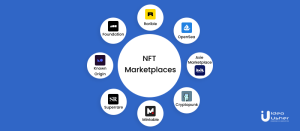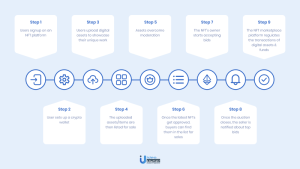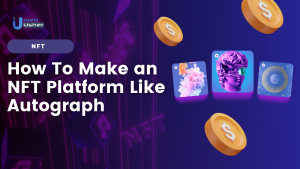NFTs have been around since 2018, but their popularity seems to have exploded this past few years. From art to music to NBA clips, these digitalized assets representing real-life objects seem to have captured investors’ imagination as they continue to shell out millions to grab a piece.
Get this, the most expensive NFT ever sold went for a cool 69 million dollars. NFT worth thousands of dollars is traded every day. 2020 saw a record 250 million dollars in NFT sales.
Check this blog out as Idea Usher experts guide you through the world of NFT minting.
Sudden rise in popularity of NFT
Many crypto experts have predicted NFTs to be the future of ownership of properties and other assets. According to NFT enthusiasts, all types of properties will see their ownership status tokenized digitally.
- NFTs provides the ability to securely purchase, value, and exchange digital art through the use of a digital ledger
- Newer platforms also keep getting launched. Binance NFT marketplace and Featured by Binance are some of the latest marketplaces where people can buy and sell NFTs
- Marketplaces regularly have NFT drops that account for bumps in attention. An NFT drop refers to when a new art collection gets listed on a marketplace
- NFTs are more entertaining than cryptocurrencies. They represent a cooler way for the layman looking to get into the world of cryptocurrencies
What is NFT minting?
For years metal coins have been minted and circulated as currencies. Similarly, NFT minting is the process of generating NFTs. In order for your digital work to be included in the Ethereum blockchain, you must first mint NFT.
E.g your digital artwork can be signified as an NFT. This will allow it to be bought and switched on the marketplace. Also, if it is resold in the forthcoming years, it can be digitally followed.

NFT minting as an investment option
NFTs represent high-value, one-of-a-kind digital tokens in the crypto world. The growing global popularity of NFT has pushed many investors to use them as a marketing tool.
Ethereum gained huge traction by introducing NFT standards. This led to other blockchain networks adopting and inventing new NFT standards. As NFTs evolved, the minting process has been increasing in complexity simultaneously. New companies are plunging into the NFT trend to increase the visibility of their business.
Today NFTs are getting sold for huge sums at auctions and online marketplaces. Needless to say, the financial benefits of minting NFT can’t be overlooked. The minted NFT can be used as collateral for fiat currency with the option of liquifying them whenever you want.
Important factors to consider before minting

Investors need to keep in mind certain factors before pursuing NFT minting. Basic awareness about NFT can give a reliable impression of the ways to approach their creation and representation.
1. Blockchain platform
The first thing to consider before minting is a comprehensive list of the different blockchains which support NFT tokens. Some of the best platforms are
- Ethereum
- Polkadot
- Binance Smart Chain
- Tron
- EOS
- Tezos
- WAX
- Flow by Dapper Labs
- Cosmos
| Blockchain Platform | Pros | Cons |
| Ethereum | The most popular platform at today’s time |
|
| Flow | Quick and cheap transactions | Slower transaction time |
| Tezos | Ranks high in safety and code correctness | Often delay in token issuance |
| EOS | Relatively cheaper than other cryptocurrencies | Still attached to Bitcoin in terms of price movements |
2. NFT ecosystem
The next thing to establish is: Does the platform of your choice have the necessary infrastructure to support the transfer and sales of NFTs on other blockchains? For this, the NFT developers should be aware of the positive and negative aspects of each platform before proceeding further.
3. Cost-effective platform
Those who are still not fluent with the intricacies of the minting process, need to study the market. This will make you aware of the free platforms that are higher up the popularity and reliability chain. Ethereum, Flow, and Binance Smart Coin are two popular options operating on a large scale.
4. NFT marketplace
The choice of an effective and popular marketplace happens to be the most crucial factor during NFT minting. Both Ethereum mint and Binance Smart Coin provide the developers with a wide array of NFT platforms to choose from. These include Rarible, Mintable, and OpenSea among others.
| NFT Marketplaces | Trading Volume |
| Rarible | $ 210 million |
| OpenSea | $ 6.5 billion |
| Axie Marketplace | $ 2.1 billion |
| Cryptopunks | $ 1.3 billion |
| Superrare | $ 18.6 million |
| Known Origin | $ 6.9 million |
| Foundation | $ 79 million |

NFT minting platform
The place created to encourage the buying and selling of NFTs is referred to as the NFT Minting PLatform. Users looking to solely trade in NFT can do so even without comprehensive knowledge about Bitcoin technology and the coding of smart contracts.
Development of NFT minting platform
Minting is an essential step if you want to put up your NFT for sales. This helps to track the NFT on the blockchain network, make it tamper-proof and the NFT then won’t be modifiable.
Advantages of NFT minting platform
- You can mint an unlimited number of NFTs
- There is the option of trading NFT on a global scale
- NFTs are a stable revenue generator
- It is a sustainable way for your business to gain traction among the crypto crowd
- Better market visibility among the crypto world
- These are used as a marketing tool to launch new products
Features of NFT minting platforms
NFT minting platform should contain the following features to generate more traffic.
1. Storefront
This guarantees more traction. Storefront describes the overall functionalities of the site, its purpose. It often contains information about new and trending NFTs. The presence of a clean and optimized storefront is a necessity if you want your visitors to stay on the minting platform.
2. Search And Filters: Visitors to your site will like a clean experience and an option to search for whatever they are looking for. A well-optimized search and filter section does precisely that. Filters can be price, sorting mechanism, categories, etc.
3. Buy And Auction Features: Every Platform should have different selling mechanisms. This will aid in the easy selling of NFT. Like an automatic time counter, there should be an option to increase the auction time by 15 minutes for every last bid.
4. Creator Profile: A personalized page for the collectors describing the artist/collector with links to social media accounts. This page will also house the collector/artist’s history of transactions.
5. Wallet Compatibility: Every minting platform will require a wallet linked to it. This will allow any form of transaction associated with the NFTs. This includes payment of gas fees, buying and selling NFTs, and other such charges.
Step-by-step Guide on how to mint an NFT

1. Create a wallet
Depending on the platform you are looking to enlist your NFT on, you should look to create a digital wallet. Ethereum is a popular option in most cases, although there are several other options for the safekeeping of your NFT. If you combine your web wallet with your wallet by means of an extension, it will make the process of connecting to a marketplace easier.
2. NFT marketplace selection
The choice of a proper and cheap marketplace to enlist your NFT depends on several factors. The security and reliability of the marketplaces are of major concern.
3. Connect wallet to the marketplace
Once you have set up your wallet, you can head over to any NFT marketplace which your wallet supports. Then you can link the wallet to the marketplace of your choice
4. Create the NFT
Whichever item you wish to tokenize, you need to create a digital file for it which can then be uploaded. For art pieces, you need them in JPG, PNG, etc format. Music pieces can be in the form of Mp3, WAV, etc.
If you are looking for long-term options to store the NFT file, then it’s better to store it in a blockchain such as an IPFS system. It is a safer option than cloud services like Google Drive.
5. Add information about NFT
It is mandatory to add the name of your NFT. You will also have the option of including additional information like a description of your NFT.
6. Pay gas fees and upload
Once you have created the item, your wallet will send a request to pay the network gas fees. You can see the amount required to mint your NFT at this junction. You can approve the payment and your token will be uploaded.
In some cases, the marketplace might give you the option of a faster transaction in exchange for a higher fee.
7. List your NFT for sale in the marketplace
You are now ready to enlist your NFT for sale. After checking the categories available for listing, you can choose the option that best suits your You can either put it up for auction or quote an instant sale price.

Assets that can be minted
A few of the mintable NFTs have been listed according to ascending order of popularity:
1. In-game assets
Already a multi-billion dollar industry, NFT has changed the face of the gaming industry. Investors are experiencing rising popularity and subsequently demand for in-game assets among the gaming community.
2. Virtual Collectibles
This has been an all-time favorite with traders collecting and dealing with collectibles like famous and important tweets, music, short videos, etc.
3. Digital Arts
These days the crypto crowd is flocking to collect digital arts. As a result, this is the type of asset which has the capability of generating the maximum revenue.
4. Virtual properties
The next level of generating NFT is here giving you a chance to be the virtual owner of lands and properties including hotels, restaurants, etc.
5. Domain Names
Since IP addresses are difficult to remember, they are disguised in the form of domain names. This contributes to their popularity in the blockchain world or even in the more conventional digital world.

Top NFT minting agencies
Here are the top NFT minting agencies that are taking the crypto world by storm.
1. Coinbound
This is one of the most popular places to buy and sell NFTs. Coinbound was established in December 2017, by Devin Finzer and Alex Atallah. With an active user base of nearly 120,000 and a reported trading volume of 518M across their collection of digital assets, this is a top choice for developers.
Etherium is the most widely accepted form of payment. OpenSea levies a charge of 2.5% on each sale price, for offering a marketplace.
2. Numomo
A Korea-based NFT creative agency offering end-to-end helping creators and artists mint their NFTs. With a clientele comprising mainly of artists and creatives, they have NUMOMO Academy, which teaches people how NFTs work, and NUMOMO Agency. The agency helps artists go from ideation to production, to the sale of their NFT.
3. 1 NFT
Based in Ukraine, the company was founded in 2020. This agency provides celebrities services so that they can create their own NFTs without the hassle of learning everything on their own.
4. Mintbase
Created by Carolin Wend and Nate Geier, MIntbase is home to purposeful NFTs. This platform allows anyone to create digital assets verified on multiple blockchains.
With the evolution of NFT development platform, content creators might be able to mint blogs, stories, articles, etc. in the future. Share on XFinal words
The process of creating NFT is a relatively easy one. Once you create a wallet, you are good to go. The minting agencies and development platforms are making sure that NFT is for everyone and can be a steady source of revenue for developers or creators of digitalized tokens in the future.

Idea Usher’s NFT minting platform development services
Whether it is developing an NFT marketplace to deliver a unique NFT platform experience or listing unique collectibles and digital assets, Idea Usher is here to help you through your journey. Our experienced developers can help you mint NFTs and unleash the true potential of your crypto-journey.
Contact us today and get expert consultation for free.
A Skilled Developer For Every Project
Trusted by 100+ clients
FAQ
Does minting NFT guarantee its sale?
Just because you create an NFT doesn’t mean you will make money. In fact, you can actually lose money if you aren’t careful. Creating a non-fungible token that someone wants to buy takes a plan, patience, and consistency.
What all can be minted into an NFT?
Technically speaking, you can mint just about anything into an NFT if you want. Considering an NFT is just data that is stored on a digital ledger, you can store any data you want.
Are minting NFTs eco-friendly?
Non-fungible tokens are not the most eco-friendly way of transacting, but that doesn’t mean there isn’t hope for the future.






















